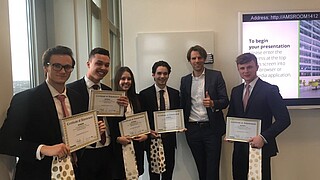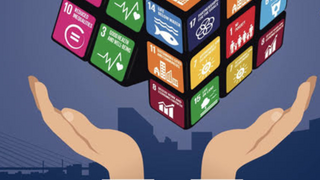Nine groups of students worked on five business cases and were guided throughout by academic coaches Dr Mathijs Cosemans, Prof. Mathijs van Dijk, the master programme’s academic director Prof. Dirk Schoenmaker, Prof. Marno Verbeek, and Prof. Wolf Wagner. The LMC is organised and facilitated by Veronika Brantova in the RSM Career Centre.
Such projects can bring tangible benefits for companies taking part: last year sustainable bank Triodos worked with RSM master students on the same kind of project, which resulted in Triodos investing in the company that the students had analysed. “Last year one of the groups proposed Corbion as a company for our Sustainable Food and Agriculture theme. This was one of the reasons for us to look further into the company, and now it is one our holdings in the Triodos Pioneer Impact Fund,” said Fabian Meijs, investment analyst at Triodos.
Fresh and unbiased perspectives
ABN AMRO was particularly keen to hear the students’ fresh and unbiased perspective of finance and investments, especially on the topic of due diligence for sustainability in the financial sector. The case the students worked on for ABN AMRO was about putting responsible business practices into the mainstream globally, for which ABN AMRO Corporate & Institutional Banking wants be a frontrunner. In its efforts to accelerate the shift to sustainable business practices, the bank sets standards and performs due diligence for the corporate and institutional clients for which it provides services and finance. “However, the lack of standardisation across financial institutions can create challenges to monitoring and benchmarking sustainability strategies, and can heighten the risk that such strategies result in green-washing rather than achieving meaningful impact,” said ABN AMRO. It wanted to know what role it could play in the standardisation of sustainability due diligence in the financial sector, and how financial institutions could co-operate effectively to help clients in the transition to sustainability.
ABN AMRO found the students became familiar with the topic very quickly, and their research produced interesting and relevant background information. Their thorough analyses revealed the commonalities and common purposes of players in the financial sector. The students’ solution was ‘viable and effective’ said ABN AMRO and the students were also able to describe in detail its limitations and suggest ways to overcome them.
RSM’s Prof. Marno Verbeek said of the students working for ABN AMRO: “The students said their most impressive learning experience was that the problems they were asked to look at were far more complicated than they had imagined, taking into account real constraints and practical considerations, indicating a big leap between textbook knowledge (and theoretical understanding) and practical implementation, particularly so in an area where data are challenging and not much literature is available yet.”
The students’ insights will be used in the development of a new sustainability due diligence tool and will focus efforts on the further standardisation of sustainability due diligence in the financial sector.
“Based on the students’ reports, it is clear to us that we have to move towards a web-based application that is also accessible to clients,” said ABN AMRO. “The outcome has highlighted that there is room for co-operation on this topic between financial institutions which can benefit the sector as a whole, and prevents greenwashing.”
An enjoyable new way of learning
The students working on the ABN AMRO case commented they enjoyed this new way of learning; they had been able to develop important soft skills such as working in a group at a distance, and interacting with practitioners, as well as using their creativity.
Most challenging was co-ordinating their work from a distance: “My group never met in person and we did not know each other before,“ said the student group that worked on the case, “so it was challenging to get to know each other and at the same time co-ordinate our work for the Living Management Project. “So far, we have managed to deliver a report that reflects our different ideas and backgrounds.”
Students also had the opportunity to experience ABN AMRO as an employer, although they regretted that there was no opportunity to meet the ABN AMRO team in person. They also noted that a complete theoretical background on the topic is essential for navigating the initial phase of the case. Their tutor was available throughout and gave detailed feedback to each student at the conclusion of the LMC.
Allocating strategic and sustainable assets
Asset management company Aegon challenged the students to explore how environmental, social and governance (ESG) considerations could be integrated into the allocation of strategic assets; a complex case that included the consideration of asset classes, industries, and geographies. Despite the ‘new normal‘ of meeting and working together completely online rather than in person, the students delivered creative solutions, said Aegon. “We will use their ideas in our thinking about strategic asset allocation. We hope it was an interesting learning experience for the students and that it offered an insight into the exciting but at times challenging world of sustainable finance.”
How much to fight climate change?
Eden Holland sought a communication device that would tell of the value of its planned science centre, living laboratory and museum that will be built next to the Floriade site in Almere in Flevoland. The students were asked to calculate the annual profit and loss statement for the project for sustainability, education and inclusion; they investigated the monetised impact of fighting climate change.
Praising the students’ energy and creativity in tackling the case, Eden Holland said it would include the outcome of the students’ project as a chapter in its own business case; the Foundation hopes that it will help it to bring in the investment financing that it is looking for.
Creating company assessments
PGGM, a non-profit co-operative pension administration organisation, also wanted a fresh perspective on the questions it posed, as well as offering talented students a learning opportunity.
Its cases focused on two important aspects of responsible investing: strategies and best practices in integrating ESG in fixed income portfolios, and the analysis of the relationship between social and environmental impact and financial performance in equity investments.
From their research, the students were able to give advice for building or compiling a tailored ESG database and company assessments. They were clear that a responsible investor must know and be able to communicate what it owns, including its own ESG risks and impact. There is a limit to how much of the task of providing that information can be outsourced to data providers and fund managers. The outcomes of the two PGGM cases will guide further internal research on these topics, said PGGMN.
What’s more, the cases have been well received and appreciated by stakeholders. The outcomes include valuable advice and insights, and can help to shape arguments in internal discussions in future.
Investment philosophy
The motivation of sustainable bank Triodos was to enable the students to become familiar with its investment process by asking them to use the bank’s own investment philosophy to select companies in which to invest. Awareness of sustainability is vital for analysing a company’s potential for long-term value creation; Triodos believes that sustainability and long-term value creation go hand in hand and hoped the students would bring it some good ideas for potential investments.
Two groups of students working on a business case for Triodos devised investable ideas for its listed equity funds by following the steps in the bank’s investment process. First, they looked for the positive impact and links it to one of Triodos’ transition themes, then ensured it met minimum standards, and finally the students performed an integrated financial and sustainability analysis.
Each group produced at least four ideas in the first stage, after which Triodos selected two companies for further analysis. One group looked for companies for the Innovation for Sustainability theme, and the other group for companies in the Social Inclusion and Empowerment theme.
“We liked that the groups’ creative ideas for investment looked at our transition themes from a slightly different angle. They had an open mind about proposing the companies that they analysed, and those will stay on our radar, possibly for further analysis by our own team when valuations come down. If that’s the case, the information provided by the students would certainly be useful as a starting point.”


